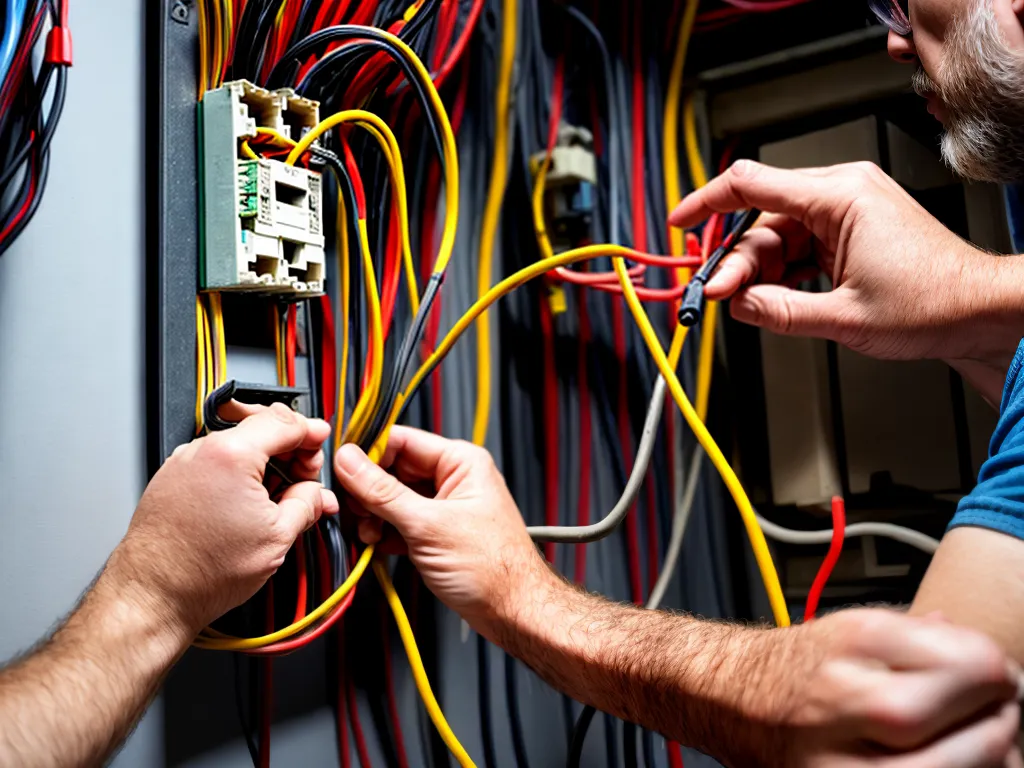
Electrical wiring is an essential part of any building, but it can also be very dangerous if not done properly. There are some unsafe wiring methods that should always be avoided.
Using Extension Cords as Permanent Wiring
Extension cords are meant for temporary, occasional use - things like plugging in a fan or string lights for a party. They are not intended as permanent wiring solutions. However, some people try to use extension cords to wire things like lamps and appliances. This is an unsafe practice for a few reasons:
- Extension cords lack safety features like circuit breakers and wire gauges meant for permanent wiring. They can easily overheat and cause fires.
- They are prone to damage from being moved around and tripped over. Damaged cords pose shock and fire risks.
- Connections are exposed and do not remain fixed and secure like permanent junction boxes and outlets. Exposed connections are points of failure.
Trying to meet electrical needs with extension cords instead of permanent wiring is a definite fire hazard. It also often results in a tangled mess of cords strewn about the home - an additional trip and injury risk.
Using the Wrong Wire Gauge
Electrical wire comes in a variety of sizes known as wire gauges. The gauge must match the amperage rating of the circuit. For example, common household 15 amp circuits should use 14 gauge wire. If the wire is too small for the amperage, it can overheat and potentially start fires.
Some key points about wire gauge:
- Lower gauge numbers indicate thicker wires. For example, 12 gauge is thicker than 14 gauge.
- Thicker wires can safely handle more amperage.
- When in doubt, always choose thicker wire than needed - an electrician can advise the proper gauge.
- Using wire that is too thin for a circuit is an unsafe practice that often leads to fires.
Overloading Circuits
Every electrical circuit has an amperage capacity designed to safely handle a certain electrical load. When too many devices are plugged into the circuit, this can overload it. Signs of an overloaded circuit include:
- Frequent tripping of the circuit breaker - it trips because the circuit is drawing more amperage than it's designed for.
- Dimming of lights when too many lights or appliances are turned on at once.
- Outlets or switches feeling warm - a sign of excess amperage passing through.
- Buzzing from outlets indicating strain on the electrical wiring.
Overloading circuits can lead to insulation breakdown and fires. It's critical to be aware of your home's circuit capacities and avoid plugging too many devices into outlets.
Using the Wrong Wiring Techniques
Dangerous wiring mistakes include things like:
- Loose connections - wires not securely fastened with wire nuts leads to arcing/sparking.
- Unenclosed splices - exposed damaged wires also lead to shorts.
- Damaged wire insulation - risk of contacting live conductors leading to shock/fire.
- Overstuffed electrical boxes - wires chafe and overheat.
Proper technique is essential in joining and splicing wires securely while avoiding damage to insulation. All connections must be secure and fully enclosed within electrical boxes. Damage which exposes bare copper wiring must always be addressed - this risks significant hazards including fires, shocks, and electrocution.
Not Using Proper Safety Gear
Working with electrical wiring carries the risk of severe shock and injury without proper precautions:
- Wear insulated gloves and boots - these prevent shocks from live wires.
- Use a fiberglass ladder - never use a metallic ladder which can conduct electricity.
- Wear safety goggles - protects eyes from hazards like sparking wires.
- Turn off power at the main breaker - prevents shocks from live circuits.
- Use GFCI outlets - interrupts power if a shock hazard occurs.
Ignoring basic electrical safety practices dramatically increases the risk of severe injury and death due to shocks. Proper gear and shutting off the main breaker are absolute musts for those working on wiring.
Allowing Cables To Make Contact With Plumbing Lines
Electrical cables and plumbing lines should never touch or cross one another. This is because water is an excellent conductor of electricity. If power cables make contact with water pipes, the plumbing can become energized. Anyone touching a faucet, appliance, or other plumbing fixture could experience severe shock or electrocution.
Other risks include:
- If a plumbing leak occurs near wiring, it can cause dangerous shorts.
- Energized plumbing corrodes more rapidly.
- Nearby electrical heat can cause plastic plumbing joints to fail.
Maintaining safe separation between electrical and plumbing is a basic wiring precaution that should never be ignored during construction or rewiring projects.
Conclusion
Dangerous wiring leads to electrical fires, shocks, and electrocutions every year. Practicing proper electrical safety comes down to:
- Using the right gauge wire for the amperage rating.
- Avoiding overloading circuits.
- Making solid, enclosed connections.
- Keeping wiring safely separated from plumbing.
- Using protective gear during work.
Following basic codes and best practices prevents electrical hazards. Homeowners should familiarize themselves with safe wiring and defer to licensed electricians when in doubt. Never take shortcuts when it comes to home electrical safety.